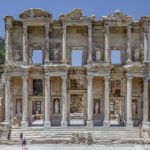Members Of Ancient Turkish Christian Community Try To Get Back To Normal
- Bu konu 1 izleyen ve 0 yanıt içeriyor.
-
YazarYazılar
-
4 Şubat 2008: 13:21 #24454klausAnahtar yönetici
Assyrian women and children attend a prayer at the 7th century church of Mor Dodo in the village of Haberli, southeastern Turkey on Sunday. Relative calm following decades of intense fighting in southeastern Turkey and the mainly Muslim country's drive to join the EU are encouraging Assyrian families to return to the region.
“If there hadn't been peace, we wouldn't have returned,”said Ninua's father, Erden, who left with his family for Switzerland more than 20 years ago and was back for his first Christmas in Haberli.
“We're here to live in solidarity with the other villagers,” he said, as his wife Sara offered cookies to visitors sitting by a Christmas tree in their house.
Saliba said he easily secured Turkish permission to return and build a three-story house of stone that towers over the village. But he said Haberli suffers frequent power cuts and lacks a public sewage system.
Unlike officially recognized religious minorities such as Jews and Greek Orthodox Christians, schools aren't allowed to teach Syriac, a modern version of the Aramaic spoken in Jesus' time. So there's no suitable school for Saliba's three Swiss-raised children who speak Syriac, but not Turkish.
An EU report in October said “very few” Assyrians have returned due to harassment by pro-government Kurdish militiamen and paramilitary police.
The Assyrians encapsulate the complexities of a country that is mostly Muslim, professes strict secularism and shrinks from any recognition of ethnic pluralism. A sign at the entrance to Haberli proclaims that “The motherland is a whole and cannot be divided — a tacit warning to Kurdish rebels and anyone else seeking separate status.
The Assyrians have mostly sought to stay neutral between the government and the Kurdish rebels, but neutrality has sometimes made their loyalties suspect on both sides. That, and a lack of jobs, have pushed many of them to emigrate, reducing the number of Christians in the region to an estimated 4,000 at most. Saliba said that 30 years ago, around 75 families lived in Haberli. About 20 families remain.
Human rights groups say soldiers forcibly emptied thousands of villages throughout the region to deprive the Kurdish rebels of local support. Fikri Turan returned from Germany to the village of Sarikoy to find his house occupied by pro-government Kurdish militiamen who refused to leave until the governor personally intervened.
Turan spent Dec. 25 at the fourth century Mor Gabriel monastery, one of the world's oldest, where visitors from Europe attended early morning services and ate traditional Christmas meals of boiled meat with onion.
For Assyrians, the clashes of the 1980s and 1990s were the most recent in a series of challenges to a community that traces itself to the pre-Christian Assyrian Empire. According to tradition, Assyrians began adopting Christianity in the first century AD, 600 years before the region was conquered by Arab Muslims.
-
YazarYazılar
- Bu konuyu yanıtlamak için giriş yapmış olmalısınız.

















